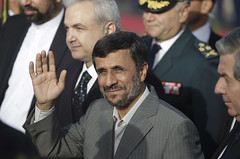
Iranian President Mahmoud Ahmadinejad paid a state visit to Lebanon where he was hailed as a major figure in regional politics in the Middle-East. The U.S. government has attempted to isolate Iran but the state has gained international acclaim.
Originally uploaded by Pan-African News Wire File Photos
Iranian president vows to stand by Lebanon against what he called hostilities from Israel
13 Oct 2010 22:19 GMT
Mahmoud Ahmadinejad is undertaking his first state visit to Lebanon
Mahmoud Ahmadinejad, Iran's president, has praised Lebanon for its resistance against Israel before a massive crowd at a controversial rally organised by Hezbollah in the group's stronghold in Beirut, the Lebanese capital.
"Lebanon is the school of resistance and perseverance against the bullying forces of the world, and is like a university for jihad, for adventure in the way of the noble, human causes," Ahmadinejad said on Wednesday while calling for a united Islamic world.
Hassan Nasrallah, the Hezbollah leader, did not appear in person at the rally because of security concerns but welcomed Ahmadinejad in a speech broadcast via video link.
During his first official state visit to the country, Ahmadinejad earlier pledged to stand by Lebanon in confronting what he called hostilities from Israel.
He also extended Tehran's unstinted support to a "unified Lebanon and its government".
Ahmadinejad was given a tumultuous welcome on arrival by thousands of Shia Muslims who lined the road from the airport, throwing rice and flower petals at his motorcade.
Even though the Iranian president was on an official visit, Al Jazeera's Zeina Khodr, reporting from Beirut, said that Wednesday night's rally was not organised by the state.
Khodr said Hezbollah leaders have told her that the rally was arranged by the group to "thank the Iranian leader for the political as well as the financial support the Islamic Republic of Iran provided, particularly to Hezbollah supporters, after the 2006 Lebanon-Israel war".
Sensitive timing
Ahmadinejad's trip has raised concerns in Washington, which wants to isolate Iran over its nuclear programme and says Iran's support for Hezbollah fighters undermines Lebanese sovereignty.
The White House described the visit as "provocative" with spokesman Robert Gibbs saying that Ahmadinejad's visit showed that the Iranian president continued his "provocative ways" even as he led his country into more economic distress and turmoil under nuclear sanctions.
"I think that it also suggests that Hezbollah values its allegiance to Iran over its allegiance to Lebanon," said Gibbs.
US Secretary of State Hillary Clinton earlier denounced any effort by the Iranian president to undermine Lebanon's sovereignty.
"We reject any efforts to destabilize or inflame tensions within Lebanon," Clinton said in Kosovo.
"We would hope that no visitor would do anything or say anything that would give cause to greater tension or instability in that country."
Israel was also very critical, with Yigal Palmor, its foreign ministry spokesman, saying the visit was "imbued with a message of confrontation and violence".
Marwan Bishara, Al Jazeera's senior political analyst, said the fact that Ahmadinejad was speaking to a mostly southern Lebanese crowd on Wednesday night was significant as the south Lebanese "are the people that were mostly under Israeli occupation for 18 years, and they were able under Hezbollah's leadership, to resist that occupation ... in part through Iranian help."
But earlier, speaking at presidential palace, Ahmadinejad made no mention of Hezbollah, emphasising instead Iranian support for the country as a whole.
"We support a strong and unified Lebanon. We will always back the Lebanese government and its nation," he said, standing alongside Michel Sleiman, Lebanon's president.
Gebran Bassil, Lebanon's energy and water minister, said Iran had agreed a $450m loan for Lebanon to support power and water projects. He said Ahmadinejad had stressed during the talks that "all the benefits of this visit would be for all the Lebanese", rather than for a single faction.
Lebanese divide
Lebanon's government, which includes Hezbollah ministers, is deeply split over an international investigation into the killing of al-Hariri which is expected to indict Hezbollah members.
Prime Minister Saad al-Hariri, son of the slain statesman, is resisting escalating pressure from Hezbollah and its allies to renounce the UN-backed probe before it issues indictments.
Ahmadinejad had a rare telephone call on Tuesday with Saudi Arabia's King Abdullah, whose country supports Hezbollah's Sunni Muslim rivals, but no details were given of their conversation.
The West accuses Iran of supplying arms to Hezbollah, which says it has an arsenal of more than 30,000 rockets.
Officials close to Hezbollah stress instead Iran's support for reconstruction, saying they have spent about $1 bn of Iranian money since 2006 on aid and rebuilding.
Gulf Arab states Saudi Arabia and Qatar, vying for influence with Tehran, have also provided funds.
Ahmadinejad is due on Thursday to visit towns near the Israeli border which were heavily bombed by Israel during its 34-day conflict with Hezbollah in 2006.
Source: Al Jazeera and agencies
No comments:
Post a Comment